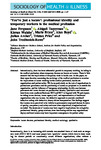'You're just a locum': professional identity and temporary workers in the medical profession
| dc.contributor.author | Ferguson, J | |
| dc.contributor.author | Tazzyman, A | |
| dc.contributor.author | Walshe, K | |
| dc.contributor.author | Bryce, Marie | |
| dc.contributor.author | Boyd, A | |
| dc.contributor.author | Archer, Julian | |
| dc.contributor.author | Price, Tristan | |
| dc.contributor.author | Tredinnick-Rowe, JF | |
| dc.date.accessioned | 2020-10-28T14:35:52Z | |
| dc.date.issued | 2020-10-28 | |
| dc.identifier.issn | 0141-9889 | |
| dc.identifier.issn | 1467-9566 | |
| dc.identifier.uri | http://hdl.handle.net/10026.1/16609 | |
| dc.description.abstract |
<jats:title>Abstract</jats:title><jats:p>Internationally, there has been substantial growth in temporary working, including in the medical profession where temporary doctors are known as locums. There is little research into the implications of temporary work in health care. In this paper, we draw upon theories concerning the sociology of the medical profession to examine the implications of locum working for the medical profession, healthcare organisations and patient safety. We focus particularly on the role of organisations in professional governance and the positioning of locums as peripheral to or outside the organisation, and the influence of intergroup relationships (in this case between permanent and locum doctors) on professional identity. Qualitative semi‐structured interviews were conducted between 2015 and 2017 in England with 79 participants including locum doctors, locum agency staff, and representatives of healthcare organisations who use locums. An abductive approach to analysis combined inductive coding with deductive, theory‐driven interpretation. Our findings suggest that locums were perceived to be inferior to permanently employed doctors in terms of quality, competency and safety and were often stigmatised, marginalised and excluded. The treatment of locums may have negative implications for collegiality, professional identity, group relations, team functioning and the way organisations deploy and treat locums may have important consequences for patient safety.</jats:p> | |
| dc.format.extent | 149-166 | |
| dc.format.medium | Print-Electronic | |
| dc.language | en | |
| dc.language.iso | en | |
| dc.publisher | Wiley | |
| dc.subject | locum doctors | |
| dc.subject | professional identity | |
| dc.subject | medical sociology | |
| dc.subject | qualitative | |
| dc.title | 'You're just a locum': professional identity and temporary workers in the medical profession | |
| dc.type | journal-article | |
| dc.type | Journal Article | |
| dc.type | Research Support, Non-U.S. Gov't | |
| plymouth.author-url | https://www.webofscience.com/api/gateway?GWVersion=2&SrcApp=PARTNER_APP&SrcAuth=LinksAMR&KeyUT=WOS:000582953200001&DestLinkType=FullRecord&DestApp=ALL_WOS&UsrCustomerID=11bb513d99f797142bcfeffcc58ea008 | |
| plymouth.issue | 1 | |
| plymouth.volume | 43 | |
| plymouth.publication-status | Published | |
| plymouth.journal | Sociology of Health and Illness: a journal of medical sociology | |
| dc.identifier.doi | 10.1111/1467-9566.13210 | |
| plymouth.organisational-group | /Plymouth | |
| plymouth.organisational-group | /Plymouth/Faculty of Health | |
| plymouth.organisational-group | /Plymouth/Faculty of Health/Peninsula Medical School | |
| plymouth.organisational-group | /Plymouth/REF 2021 Researchers by UoA | |
| plymouth.organisational-group | /Plymouth/REF 2021 Researchers by UoA/UoA23 Education | |
| plymouth.organisational-group | /Plymouth/Research Groups | |
| plymouth.organisational-group | /Plymouth/Research Groups/FoH - Community and Primary Care | |
| plymouth.organisational-group | /Plymouth/Research Groups/Plymouth Institute of Health and Care Research (PIHR) | |
| plymouth.organisational-group | /Plymouth/Users by role | |
| plymouth.organisational-group | /Plymouth/Users by role/Academics | |
| dc.publisher.place | England | |
| dcterms.dateAccepted | 2020-09-23 | |
| dc.rights.embargodate | 2020-11-4 | |
| dc.identifier.eissn | 1467-9566 | |
| dc.rights.embargoperiod | Not known | |
| rioxxterms.versionofrecord | 10.1111/1467-9566.13210 | |
| rioxxterms.licenseref.uri | http://www.rioxx.net/licenses/all-rights-reserved | |
| rioxxterms.licenseref.startdate | 2020-10-28 | |
| rioxxterms.type | Journal Article/Review |


